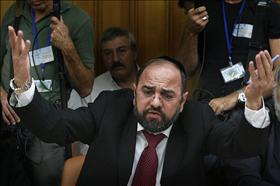religious council
Women only 5% of religious councils
Only one woman was appointed as a member of a religious council in 2011. Not a single council chair is female. Hiddush President, Rabbi Uri Regev: The horrific discrimination against women on religious councils only provides more proof that they must be eliminated and their responsibilities transferred to local authorities.
26/01/2012 16:55
Tags: Ministry of Religious Affairs · Religious Councils · Gender Discrimination

Religious Services Minister, Yaakov Margi. 24.10.2007. Photo: Michal Patal, Flash 90
Religious Councils, local functionaries of the Ministry of Religious Services, oversee many services provided to neighborhoods throughout the country: construction and maintenance of synagogues and ritual baths, registration of local marriages, appointment of local rabbis and more.
24 years after the Shakdiel verdict concluded that discrimination of woman from religious councils is illegal, only 23 woman currently hold a position on the councils. There are 450 members of the 66 religious councils altogether. Women constitute only 5% of their membership, one of every twenty members.
In 2011, only one woman was appointed to a religious council.
Hiddush's report, “Women on religious councils—the revolution that was not” clearly reveals that women are still perceived as consumers of religious councils, and not to have any influence on policy or resource distribution.
There is not a single female council chair on any of the councils, even further limiting their capacity to influence.
The data on the discrimination of the religious councils is completely embarrassing. This is not just an issue of exclusion of women, it means their voices go entirely unrepresented in local religious decision making. It's all bad, but the worst of it is the Minister of Religious Affairs and his refusal to place a single woman at the head of a council.
Hiddush President Rabbi Uri Regev said “The data on the discrimination of the religious councils is completely embarrassing. This is not just an issue of exclusion of women, it means their voices go entirely unrepresented in local religious decision making. It's all bad, but the worst of it is the Minister of Religious Affairs and his refusal to place a single woman at the head of a council.”
Said Regev “Religious councils are a clear example of how women are asked to pay a heavy price in the civil discourse. The lack of women council members comes from the disgraceful practice of selling power to the ultra-Orthodox parties in exchange for support in the coalition.”
On average, only one of three members of religious councils have a wife. In addition, the women who are council members are very unevenly dispersed: 14 councilwomen serve in central Israel, seven in the North, two in the West, and none in the South.